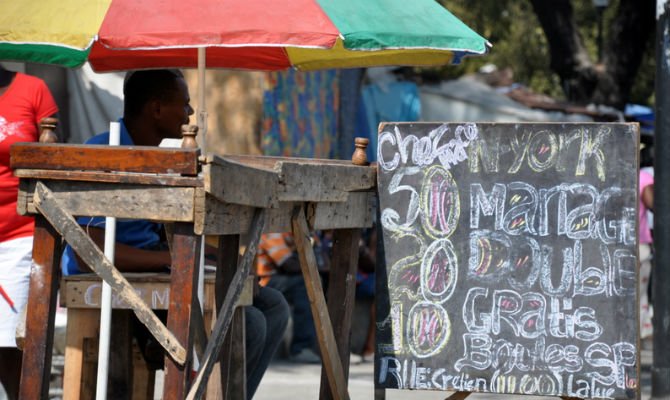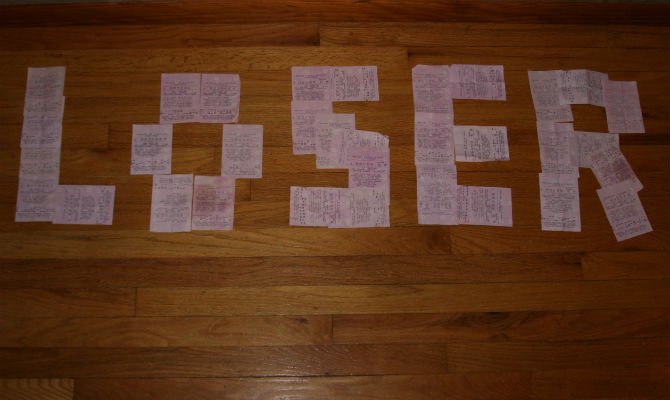If you’re like me, your experience with the lottery began and ended on your 18th birthday, when you bought lotto tickets for novelty’s sake and that was that. Sure, I see the shiny scratch-off tickets displayed in bodega windows and every once in awhile imagine how ridiculously awesome and easy my life would be if I suddenly won millions upon millions of dollars, but I’ve never devoted much time or effort to it. Seems like a waste.
Of course this is far from the case for other people, who spend a decent chunk of their mental energy and savings on buying lotto tickets. And a news story from this past weekend got me thinking about why this is. Is it really that popular? And is it really a “tax on the poor,” as some economists claim?
First of all, the story I read seemed unrelated to the lotto. It was about Haiti’s annual Voodoo festival of the dead, and it explains how the tradition honors the deceased. But one tiny detail from the piece caught my eye: “One man paid a soothsayer for advice on how to increase his chances at winning bets at Haitian outlets that play on New York State Lottery numbers.”
This was interesting to me for two reasons. (1) That Haitian outlets even play New York State Lottery numbers and (2) That people are so desperate to win they would pay a mythic or religious leader to improve their undoubtedly slim chances. But when I thought about it, the popularity of the lotto made perfect sense.

It makes sense that a country with deeply-entrenched poverty would have people looking for a miracle. Haiti is the poorest country in the western hemisphere, with 78% of Haitians living on less than $2 a day. Total lack of basic resources and infrastructure are simply a part of daily life. In this context, it makes sense that people feel hopeless about their living conditions, and that they look to the lotto as an escape route.
When I lived in the Dominican Republic for four months, I saw that some towns had more lotto ticket stations than banks, pharmacies and clothing stores. Tiny concrete buildings with brightly painted signs reading “Banca”-- the word for betting parlors-- dot every few blocks, and always attract a substantial crowd. For some, buying lotto tickets is part of a weekly routine. While some dismiss the practice as merely a voluntary entertainment habit--after all buying lottery tickets doesn’t seem like such a bad thing-- others argue it can develop into a harmful cycle. For example, one of my Dominican friends often complained that his mother wasted her wages on lotto tickets, hoping for the shot of “scoring big,” instead of saving up a small portion of money the family could use for needed groceries and school supplies.

While statistics on international lottery practices are limited, the US serves as a revealing example of just how popular, and damaging, the lottery can be.
In 2014 Americans spent a combined $70.1 billion on lottery tickets in the 43 states where the lottery is legal, which is more than Americans in all 50 states spent on books, sporting events, movie tickets, video games, and recorded music sales COMBINED. It’s a pretty staggering number, and crazy when you think about all the other things that money could have gone towards.
And the stats are made all the more problematic when you take into account that the bottom third of households buy over half of all lotto tickets, and that Americans that make $13,000 or less annually spend 9% of their income on lottery tickets each year. It means that those who are in most need of money are most likely to spend what little they have on a meager chance of winning big.

A lot of people have tried to understand why people with so little are willing to essentially waste their money on the lotto. One study found that while local lottery sales rise with poverty, movie ticket sales don’t, which seems to show that people don’t just consider the lottery as cheap entertainment, but also as a prayer to escape from poverty.
It turns into a vicious cycle: poor people buy lotto tickets, lose money, panic about their finances and buy more tickets hoping to recoup the loss. Looked at from this angle, governments are taking advantage of lower income and addicted lotto players. Ohio once even devised a marketing plan that would have lottery ads come out at the same time as government benefits because research suggested that receiving welfare and lottery play were tightly connected. This is particularly upsetting to think about when you you consider that in 2009 the lottery provided more revenue than corporate income tax in 11 states, which basically means that low-income lotto players were shouldering more of their state’s expenses than corporations.
An article in the Atlantic frames the impact of this best:
Potentially more harmful than the negative financial impact of buying lottery tickets is the psychological impact. A report from PBS found that the cumulative psychological effect of buying a lotto ticket and hoping for a win, and then losing, again and again, is draining. Especially when that time and energy could have been focused on a smaller-scale but more feasible and meaningful goal.

So, if evidence points to the lottery preying on those who are most in need of extra resources and financial opportunities, then why aren’t more people trying to do something about it? Why is the lottery such a relatively accepted part of society?
Well, as is the case with everything, there is another side of the story: what lottery ticket sales go towards. There are countless examples of lottery sales being put to good use, and raising money for services and projects that would otherwise go unfunded.
For example, in the US 44 states rely on revenue from lottery ticket sales, often to fund public education.
In the small fishing village of Inverness, Canada, a new “Chase the Ace” lottery was started to raise money for a community center and became a force of its own that drew an unprecedented number of visitors to the town that boosted its economy and morale.
In the United Kingdom there is an actual “Your National Lottery Good Causes” website, where you can select which organization your lotto ticket sales go to. Thus far the National Lottery has successfully given $34 billion dollars to over 450,000 different projects, from services for the mentally disabled to urban gardening projects with underserved youth.
The concept of a lottery is so global and so popular, it does not seem like it’s going to go anywhere anytime soon.

So the question becomes, how does the world prevent lotteries from harming the most vulnerable? Of course the availability of gambling addiction centers is key, but when you zoom out and look at the larger picture, it becomes clear that if poor people had more opportunity for economic success and if they felt they had a chance of actively lifting themselves out of poverty, lotto ticket sales would go down. If people felt more ownership over their economic situation they would be less prone to the desperate, one-lotto-ticket-can-make-all-my-problems-go-away mentality. Basically, it would feel like there was a point to slowly saving up your wages and making day-to-day adjustments. It would feel like there was another, more realistic, way out.
Quality education, adequate healthcare, reliable state institutions and availability of needed resources--these are the fundamental elements people need to lift themselves out of poverty. It’s the kind of opportunity and infrastructure that could help a man in Haiti or Ohio envision a positive future that did not involve a 1 in 175 million chance.
Help make a difference by clicking on TAKE ACTION NOW and joining the movement to end poverty.